外研版小学六年级英语易错知识点
六年级外研社英语知识点
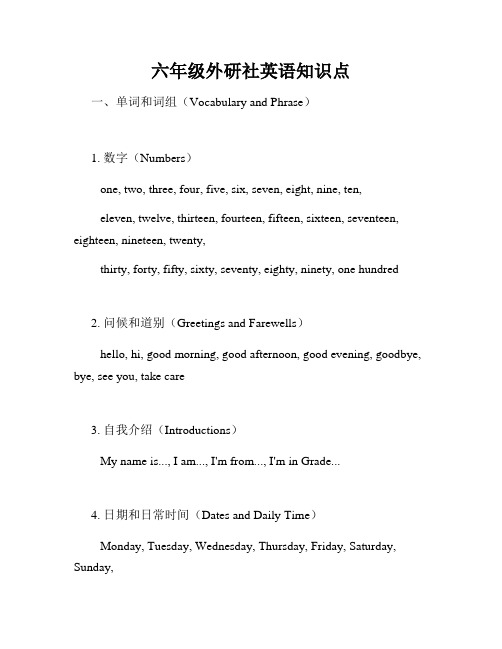
六年级外研社英语知识点一、单词和词组(Vocabulary and Phrase)1. 数字(Numbers)one, two, three, four, five, six, seven, eight, nine, ten,eleven, twelve, thirteen, fourteen, fifteen, sixteen, seventeen, eighteen, nineteen, twenty,thirty, forty, fifty, sixty, seventy, eighty, ninety, one hundred2. 问候和道别(Greetings and Farewells)hello, hi, good morning, good afternoon, good evening, goodbye, bye, see you, take care3. 自我介绍(Introductions)My name is..., I am..., I'm from..., I'm in Grade...4. 日期和日常时间(Dates and Daily Time)Monday, Tuesday, Wednesday, Thursday, Friday, Saturday, Sunday,January, February, March, April, May, June, July, August, September, October, November, December,today, tomorrow, yesterday, morning, afternoon, evening, night5. 家庭(Family)family, father, mother, brother, sister, grandfather, grandmother, uncle, aunt, cousin6. 动物(Animals)dog, cat, horse, bird, fish, rabbit, lion, tiger, elephant, monkey7. 颜色(Colors)red, yellow, blue, green, orange, purple, pink, black, white, brown8. 食物(Food)apple, banana, orange, grapes, strawberry, watermelon, bread, rice, noodles, milk, juice9. 体育运动(Sports)football, basketball, swimming, running, cycling, tennis, volleyball10. 学校(School)school, classroom, teacher, student, desk, chair, book, pen, pencil, ruler, eraser二、语法(Grammar)1. 冠词(Articles)a, an, the2. 人称代词(Personal Pronouns)I, you, he, she, it, we, they3. 现在时态(Present Simple)I/you/we/they + Vhe/she/it + Vs4. 一般疑问句(Yes/No Questions)Do/Does + 主语 + V...?Is/Are + 主语...?5. 情态动词(Modal Verbs)can, may, must6. 物主代词(Possessive Pronouns)my, your, his, her, its, our, their7. 句子的否定形式(Negative Sentences)主语 + do/does + not + V...8. 指示代词(Demonstrative Pronouns) this, that, these, those9. 介词(Prepositions)in, on, at, from, to, with三、句型(Sentence Patterns)1. 询问和回答(Asking and Answering)What is your name? - My name is...How old are you? - I am... years old.Where are you from? - I'm from...What is your favorite color/animal/food...? - My favorite color/animal/food is...Is this/that your...? - Yes, it is. / No, it isn't. It's...2. 描述事物(Describing Things)It is..., They are...It has..., They have...It can..., They can...3. 表示喜好(Expressing Preferences)I like..., I don't like...I prefer..., I don't prefer...四、听力与口语练习(Listening and Speaking Practice)1. 听力练习(Listening Exercises)Listen and number the pictures/words in the correct order.Listen and choose the correct answer.Listen and complete the sentences with the missing words.2. 口语练习(Speaking Exercises)Ask and answer questions about your name, age, and hobbies. Describe your favorite animal/color/food/sport...Talk about your daily routine.五、阅读与写作练习(Reading and Writing Practice)1. 阅读练习(Reading Exercises)Read the passage and answer the questions.Fill in the blanks with the correct words.Match the words with their meanings.2. 写作练习(Writing Exercises)Write a short paragraph introducing yourself. Write a letter to a pen pal.Write a story using the given words.六、口语交际用语(Everyday Conversations)1. 打招呼(Greeting)- Hello! How are you?- Hi! Nice to meet you!2. 自我介绍(Introducing)- What's your name?- My name is...3. 问候(Greetings)- Good morning!- Good afternoon!- Goodbye! See you later!4. 询问与回答(Asking and Answering)- How old are you?- Where do you live?5. 表达喜好(Expressing Preferences)- Do you like...?- Yes, I do. / No, I don't.以上是六年级外研社英语的知识点总结,希望对你有帮助!。
(完整版)外研版小学英语六年级上册语法知识点总结
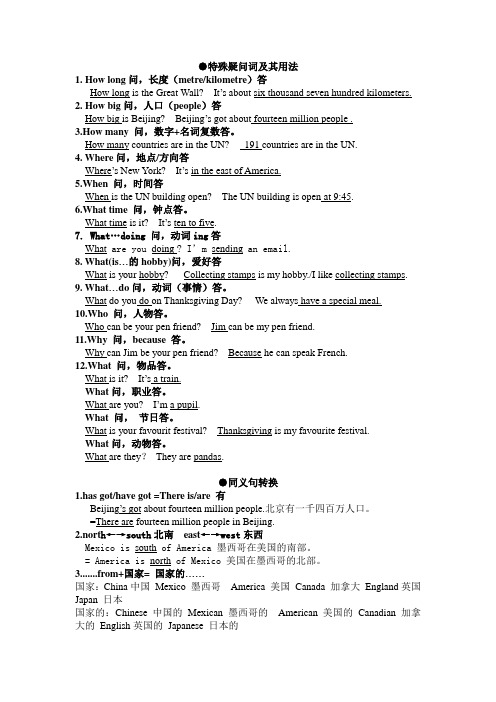
●特殊疑问词及其用法1. How long 问,长度(metre/kilometre)答How long is the Great Wall? It’s about six thousand seven hundred kilometers.2. How big 问,人口(people)答How big is Beijing? Beijing’s got about fourteen million people .3.How many 问,数字+名词复数答。
How many countries are in the UN? 191 countries are in the UN.4. Where问,地点/方向答Where’s New York? It’s in the east of America.5.When 问,时间答When is the UN building open? The UN building is open at 9:45.6.What time 问,钟点答。
What time is it? It’s ten to five.7. What…doing 问,动词ing答What are you doing ? I’m sending an email.8. What(is…的hobby)问,爱好答What is your hobby? Collecting stamps is my hobby./I like collecting stamps. 9. What…do问,动词(事情)答。
What do you do on Thanksgiving Day? We always have a special meal.10.Who 问,人物答。
Who can be your pen friend? Jim can be my pen friend.11.Why 问,because 答。
六年级英语外研版知识点总结
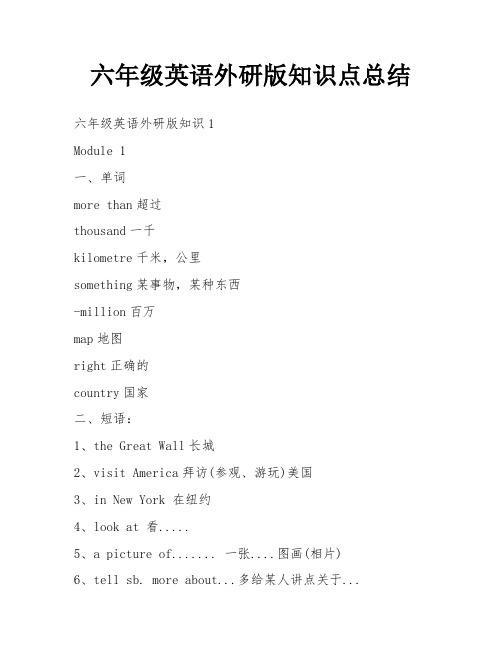
六年级英语外研版知识点总结六年级英语外研版知识1Module 1一、单词more than超过thousand一千kilometre千米,公里something某事物,某种东西-million百万map地图right正确的country国家二、短语:1、the Great Wall长城2、visit America拜访(参观、游玩)美国3、in New York 在纽约4、look at 看.....5、a picture of....... 一张....图画(相片)6、tell sb. more about...多给某人讲点关于...7、how long多长8、It`s about .它是大约(关于)9、six thousand seven hundred kilometres六千七百千米10、tell me something about...告诉我关于...的事11、how big 多大12、eight million people 八百万人13、fourteen million一千四百万14、That`s a lot!太多了!15、be great太棒了16、an animal一只动物17、in the east of在...的东部18、in the west/south/north of在...的西/南/北部19、San Francisco旧金山20、a (big) map of...一(大)张...地图21、lots of=a lot of=many/much许多22、from...to..从....到......23、such a big country=a so big country如此大的一个国家24、every day and night 每个白天和夜晚25、What am I?我是干什么的(什么职业)?三、句子1. How long/how old 的特殊疑问句问某物有多长我们可以用how long…….?如:How long is the Great Wall? 长城有多长?(注意长城前要加the ,并且要大写)How long……? 还可以用来询问时间长短。
外研版小学六年级英语易错知识点
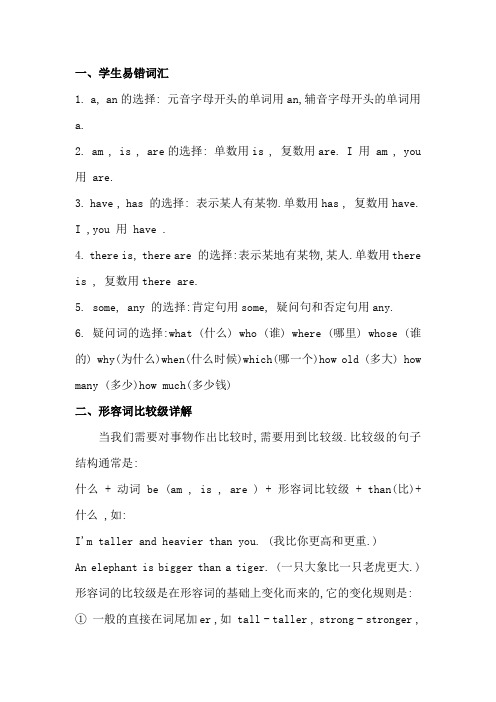
一、学生易错词汇1. a, an的选择: 元音字母开头的单词用an,辅音字母开头的单词用a.2. am , is , are的选择: 单数用is , 复数用are. I 用 am , you 用 are.3. have , has 的选择: 表示某人有某物.单数用has , 复数用have.I ,you 用 have .4. there is, there are 的选择:表示某地有某物,某人.单数用there is , 复数用there are.5. some, any 的选择:肯定句用some, 疑问句和否定句用any.6. 疑问词的选择:what (什么) who (谁) where (哪里) whose (谁的) why(为什么)when(什么时候)which(哪一个)how old (多大) how many (多少)how much(多少钱)二、形容词比较级详解当我们需要对事物作出比较时,需要用到比较级.比较级的句子结构通常是:什么 + 动词be (am , is , are ) + 形容词比较级 + than(比)+ 什么 ,如:I'm taller and heavier than you. (我比你更高和更重.)An elephant is bigger than a tiger. (一只大象比一只老虎更大.) 形容词的比较级是在形容词的基础上变化而来的,它的变化规则是: ①一般的直接在词尾加er ,如 tall - taller , strong - stronger ,②以e结尾的,直接加r ,如 fine – finer ,③以辅音字母加y结尾的,先改y为i再加er,如funny - funnier④双写最后的字母再加er,如big –bigger, thin –thinner ,hot – hotter☆注意☆比较的两者应该是互相对应的可比较的东西.典型错误:My hair is longer than you.(我的头发比你更长.)比较的两者是我的头发,你(整个人),那么比较的对象就没有可比性. 应该改为:My hair is longer than yours. 或My hair is longer than your hair.比较级专项练习:1.从方框中选出合适的单词完成句子 heavy tall long big(1) How is the Yellow River(2) How is Mr Green He's 175cm.(3) How are your feet I wear size 18.(4)How is the fish It's 2kg.2.根据句意写出所缺的单词(1) I'm 12 years old. You're 14. I'm than you.(2) A rabbit's tail is than a monkey's tail.(3) An elephant is than a pig.(4) A lake is than a sea.(5) A basketball is than a football.3.根据中文完成句子.(1) 我比我的弟弟大三岁. I'm than my brother.(2) 这棵树要比那棵树高. This tree than that one.(3) 你比他矮四厘米. You are than he.(4) 谁比你重 than you三、动词过去式详解动词的过去式的构成规则有:A,规则动词①一般直接在动词的后面加ed:如 worked , learned , cleaned , visited②以e结尾的动词直接加d:如 lived , danced , used③以辅音字母加y结尾的动词要改y为i再加ed(此类动词较少)如study – studied carry – carried worry –worried (注意play,stay不是辅音字母加y,所以不属于此类)④双写最后一个字母(此类动词较少)如 stoppedB,不规则动词(此类词并无规则,须熟记)小学阶段要记住以下动词的原形和过去式:sing – sang , eat – ate , see – saw , have – had , do – did , go - went , take - took , buy - bought , get - got , read - read ,fly - flew , am/is - was ,are - were , say - said , leave - left , swim - swam , tell - told , draw - drew , come - came , lose - lost , find - found , drink - drank , hurt - hurt , feel - felt四、动词现在分词详解动词的ing形式的构成规则:①一般的直接在后面加上ing , 如doing , going , working ,singing , eating②以e 结尾的动词,要先去e再加ing ,如having , writing③双写最后一个字母的(此类动词极少)有:running , swimming , sitting , getting五、人称和数六、句型专项归类肯定句:是指用肯定的语气来陈述的句子,如:I'm a student. She is a doctor. He works in a hospital.There are four fans in our classroom. He will eat lunch at 12:00. I watched TV yesterday evening.2,否定句:含有否定词或表示否定意义词的句子,如:I'm not a student. She is not (isn't) a doctor.He does not (doesn't) work in a hospital. There are not (aren't) four fans in our classroom.He will not (won't) eat lunch at 12:00. I did not (didn't) watch TV yesterday evening.☆注意☆小结:否定句主要是在肯定句的基础上加上了否定词 "not".有动词be的句子则"not"加在be后面,可缩写成"isn't, aren't",但am not 一般都分开写.没有动词be的句子则要先在主要动词的前面加上一个助动词(do, does, did),然后在它后面加上"not",你也可以把它们缩写在一起如"don't , doesn't , didn't ).这三个助动词要根据人称和时态来选择,其中"does"只用于一般现在时主语是第三人称单数的情况,而"did"只用于一般过去时,不论主语是什么人称和数,都用"did" .一般疑问句:是指询问事实的句子,此类句子必须用"yes",或"no"来回答.如:Are you a student Yes, I am / No, I'm not.Is she a doctor Yes, she is. / No, she isn't.Does he work in a hospital Yes, he does. / No, he doesn't. Are there four fans in our classroom Yes, there are. / No, there aren't.Are you going to buy a comic book tonight Yes, I am. / No, I am not. (Yes, we are. / No, we aren't.)Will he eat lunch at 12:00 Yes, I will. / No, I will not(won't). Are they swimming Yes, they are. / No, they aren't.Did you watch TV yesterday evening Yes, I did. / No, I didn't. ☆注意☆小结:一般疑问句是在肯定句的基础上,②动词be调到首位,其他照写,末尾标点符号变成问号即可.②没有动词be的句子则要在句首加上一个助动词(do, does, did)再把紧跟在后面的动词变回原形,末尾标点符号变成问号即可.这三个助动词也要根据人称和时态来选择,其中"does"只用于一般现在时主语是第三人称单数的情况,而"did"只用于一般过去时,不论主语是什么人称和数,都用"did" .一般疑问句有个重要的原则就是问和答要一致,即问句里的第一个单词(助动词)和简略答句里的这个词是一致的.特殊疑问句:以特殊疑问词(what , where , who , which , when , whose , why , how等)开头引导的句子.此类句子应该问什么就答什么,不能用"yes ,no"来回答.如:What is this It's a computer.What does he do He's a doctor.Where are you going I'm going to Beijing.Who played football with you yesterday afternoon Mike. Which season do you like best Summer.When do you usually get up I usually get up at 6:30.Whose skirt is this It's Amy's.Why do you like spring best Because I can plant trees.How are you I'm fine. / I'm happy.How did you go to Xinjiang I went to Xinjiang by train.☆其中how又可以和其他一些形容词连用组成特殊疑问词组用来提问,如: how many(多少(数量)), how much(多少(钱)), how tall(多高), how long(多长), how big(多大), how heavy(多重)例句:How many pencils do you have I have three pencils. How many girls can you see I can see four girls.How many desks are there in your classroom There are 51.☆小结:how many 用来提问可数名词的数量,主要有以上三种句式搭配,How many + 名词复数 + do you have 你有多少……How many + 名词复数 + can you see 你能看见多少……How many + 名词复数 + are there…有多少……七:完全,缩略形式: I'm=I am he's=he is she's=she is they're=they are you're=you are there's=there is they're=they are can't=can not don't=do not doesn't=does not isn't=is not aren't=are not let's=let us won't=will not I'll=I will wasn't=was not八、与字母相关的题型( 注:五个元音字母是 Aa Ee Ii Oo Uu )(1)将所给字母的大小写写在四线格上Hh Rr Xx Gg Mm Uu Zz Ff Qq Ii(2)写出下列字母的左邻右舍.1.( ) Hh ( )2.( ) Bb ( )3.( ) Ll ( )4.( ) Rr ( )5.( ) Qq ( )6.( ) Ww ( )(3)用小写字母抄写下列单词.1.ROOM( )2.UNDER( )3.PLEASE( )4.PICTURE( )5.WHERE( )6.TWINS( )7.EXCUSE( )8.HOW( )9.CAKE( ) 10.SMALL( )(4)将全是元音字母的那一组圈起来1. a c e2. i e o3. v u k4. e u I5. J B I6. E T V7. EI O 8. A U E(5)写出与所给单词发音相同的字母(大小写).1.bee ( )2.sea ( )3.tea ( )4.are ( )5.why ( )6.you ( )。
六年级下册英语外研版知识点
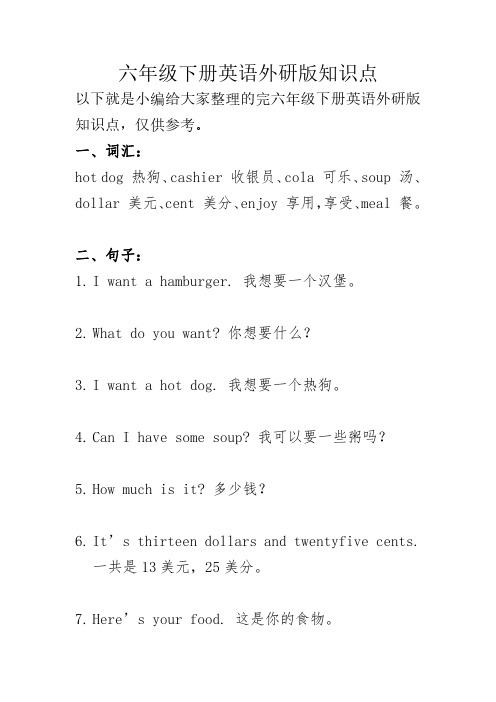
六年级下册英语外研版知识点
以下就是小编给大家整理的完六年级下册英语外研版知识点,仅供参考。
一、词汇:
hot dog热狗、cashier收银员、cola可乐、soup汤、dollar美元、cent美分、enjoy享用,享受、meal餐。
二、句子:
1.I want a hamburger.我想要一个汉堡。
2.What do you want?你想要什么?
3.I want a hot dog.我想要一个热狗。
4.Can I have some soup?我可以要一些粥吗?
5.How much is it?多少钱?
6.It’s thirteen dollars and twentyfive cents.
一共是13美元,25美分。
7.Here’s your food.这是你的食物。
8.What do you want to eat?你想吃什么?
9.I want to eat some meat.我想吃些肉。
以上就是小编给大家整理的外研版六年级下册英语的知识点。
外研版(三起)小学英语六年级上册Module 6 知识点汇总
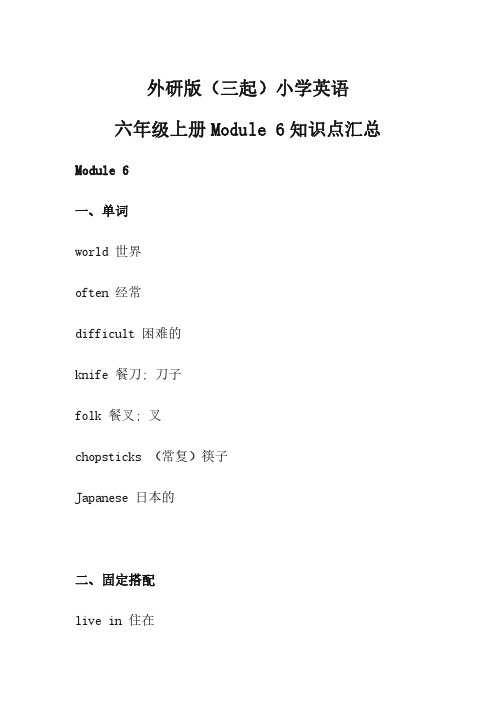
外研版(三起)小学英语六年级上册Module6知识点汇总Module6
一、单词
world世界
often经常
difficult困难的
knife餐刀;刀子
folk餐叉;叉
chopsticks(常复)筷子
Japanese日本的
二、固定搭配
live in住在
write to…给……写信
be from来自
in the park在公园里
pen friends笔友
a knife and folk一副刀叉
in the UK在英国
next year明年
a Chinese kite一只中国风筝
三、句子
1.It’s difficult for me.那对我来说很难。
2.Please write to me and we can be pen friends.请给我写信,我们可以成为笔友。
四、重点句型
1.主语+have/has got+某物(+其他).
eg:
You’ve got a letter from New York,but it’s not from Daming.
你收到一封来自纽约的信,但信不是大明寄来的。
Daming has got a Chinese dragon kite and we often fly it in the park.
大明有一只中国龙凤筝,我们经常在公园里放风筝。
2.Have you got+某物(+其他)?
eg:
Have you got a book about the US?
你有关于美国的书吗?。
外研六年级上册英语知识点归纳
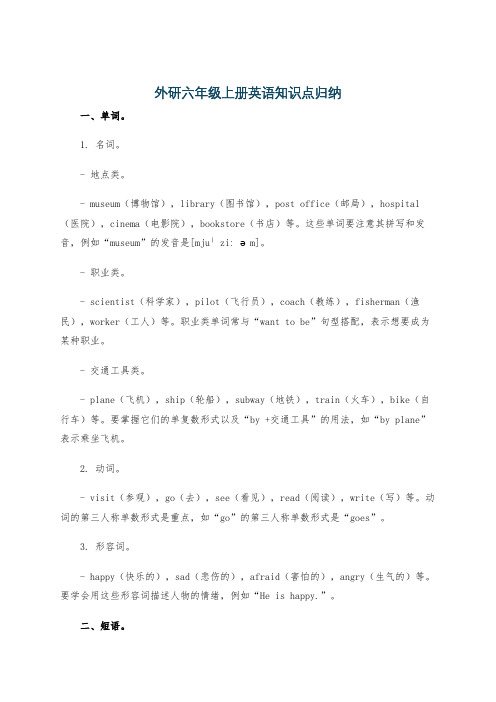
外研六年级上册英语知识点归纳一、单词。
1. 名词。
- 地点类。
- museum(博物馆),library(图书馆),post office(邮局),hospital (医院),cinema(电影院),bookstore(书店)等。
这些单词要注意其拼写和发音,例如“museum”的发音是[mjuˈziːəm]。
- 职业类。
- scientist(科学家),pilot(飞行员),coach(教练),fisherman(渔民),worker(工人)等。
职业类单词常与“want to be”句型搭配,表示想要成为某种职业。
- 交通工具类。
- plane(飞机),ship(轮船),subway(地铁),train(火车),bike(自行车)等。
要掌握它们的单复数形式以及“by +交通工具”的用法,如“by plane”表示乘坐飞机。
2. 动词。
- visit(参观),go(去),see(看见),read(阅读),write(写)等。
动词的第三人称单数形式是重点,如“go”的第三人称单数形式是“goes”。
3. 形容词。
- happy(快乐的),sad(悲伤的),afraid(害怕的),angry(生气的)等。
要学会用这些形容词描述人物的情绪,例如“He is happy.”。
二、短语。
1. 动词短语。
- turn left(向左转),turn right(向右转),go straight(直走)。
这些短语在描述路线时经常用到,例如“Go straight and then turn left at the second crossing.”。
- get to(到达),如“How can I get to the library?”。
- be interested in(对……感兴趣),例如“He is interested in science.”。
2. 其他短语。
- next to(紧挨着),in front of(在……前面),behind(在……后面)。
外研版英语六年级(上册)语法知识点详解
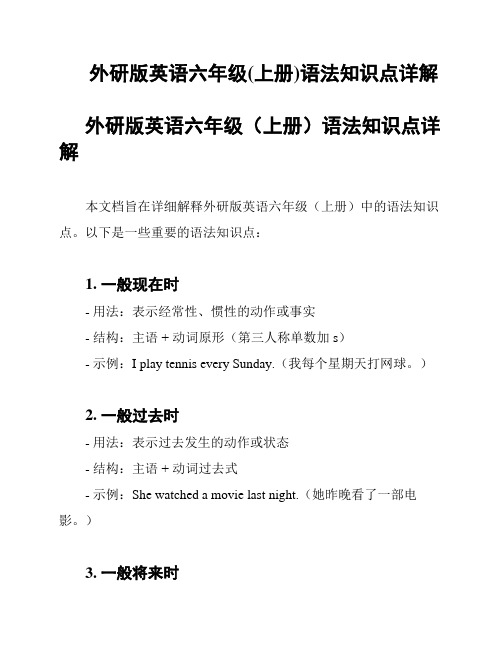
外研版英语六年级(上册)语法知识点详解外研版英语六年级(上册)语法知识点详解本文档旨在详细解释外研版英语六年级(上册)中的语法知识点。
以下是一些重要的语法知识点:1. 一般现在时- 用法:表示经常性、惯性的动作或事实- 结构:主语 + 动词原形(第三人称单数加s)- 示例:I play tennis every Sunday.(我每个星期天打网球。
)2. 一般过去时- 用法:表示过去发生的动作或状态- 结构:主语 + 动词过去式- 示例:She watched a movie last night.(她昨晚看了一部电影。
)3. 一般将来时- 用法:表示将来发生的动作或状态- 结构:主语 + will + 动词原形- 示例:I will go to Beijing next week.(下周我将去北京。
)4. 现在进行时- 用法:表示现在正在进行的动作- 结构:主语 + am/is/are + 动词ing- 示例:They are playing soccer in the park.(他们正在公园踢足球。
)5. 物主代词- 用法:表示所属关系或归属- 结构:my, your, his, her, its, our, their- 示例:This is my book.(这是我的书。
)6. 一般疑问句- 用法:用于提问- 结构:助动词/系动词/情态动词 + 主语 + 动词原形?- 示例:Do you like ice cream?(你喜欢冰淇淋吗?)7. 否定句- 用法:用于否定- 结构:主语 + do/does/did + not + 动词原形- 示例:She does not speak French.(她不会说法语。
)请注意,以上只是一部分语法知识点的概述。
在研究过程中,建议详细阅读教材并做练,以更好地掌握这些语法知识点。
祝您研究进步!。
英语易错知识点六年级
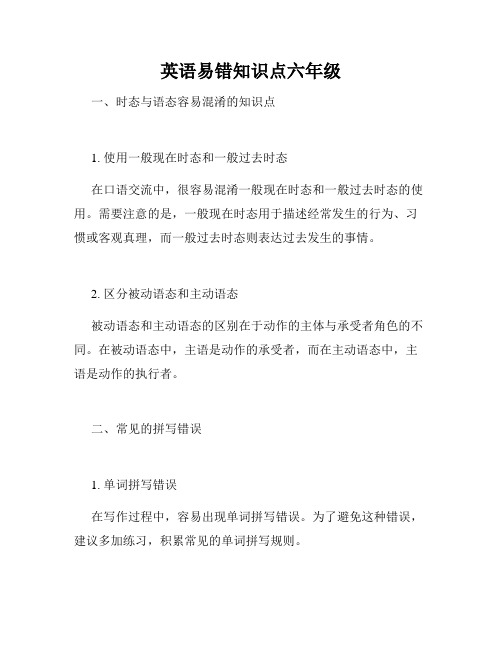
英语易错知识点六年级一、时态与语态容易混淆的知识点1. 使用一般现在时态和一般过去时态在口语交流中,很容易混淆一般现在时态和一般过去时态的使用。
需要注意的是,一般现在时态用于描述经常发生的行为、习惯或客观真理,而一般过去时态则表达过去发生的事情。
2. 区分被动语态和主动语态被动语态和主动语态的区别在于动作的主体与承受者角色的不同。
在被动语态中,主语是动作的承受者,而在主动语态中,主语是动作的执行者。
二、常见的拼写错误1. 单词拼写错误在写作过程中,容易出现单词拼写错误。
为了避免这种错误,建议多加练习,积累常见的单词拼写规则。
2. 定冠词和不定冠词的使用在使用定冠词和不定冠词时,往往会出现误用的情况。
要根据具体的语境和语义来确定使用哪种冠词。
三、易混淆的词汇1. 双音节和多音节词汇的读音双音节和多音节词汇的读音容易让学生混淆。
这时,要根据词汇的拼写规则和元音组合进行正确的发音。
2. 常见词汇的词性转换常见词汇的词性转换经常引起学生们的困惑。
要根据上下文判断词汇的具体词性,确保句子表达的准确性。
四、语法错误1. 动词的时态与主谓一致在句子中,动词的时态应与主语一致。
需要特别注意在使用助动词和情态动词时的变化规则。
2. 代词的正确使用代词在句子中起到指代作用,要确保代词与其所指代的名词在数和人称上保持一致。
五、易混淆的句型1. 特殊疑问句和一般疑问句的区别特殊疑问句需要使用特殊的疑问词来引导,而一般疑问句则直接将句子变为疑问形式。
2. 否定句和肯定句的转换在转换否定句和肯定句时,需要注意动词的否定形式和句子结构的调整。
六、易错易混词汇1. 相似词汇的辨析在英语中,存在很多相似但含义不同的词汇,容易让学生们混淆。
在使用这些词汇时,要注意区分它们的具体含义和用法。
2. 同音词的区分同音词在发音相同的情况下,容易造成理解上的困惑。
通过上下文的语境来推断词汇的具体含义,避免产生歧义。
总结:以上是六年级英语学习中容易出错的知识点,包括时态与语态的混淆、拼写错误、词汇的混淆、语法错误、句型的混淆以及易错易混词汇。
最新外研版英语六年级上册知识点总结
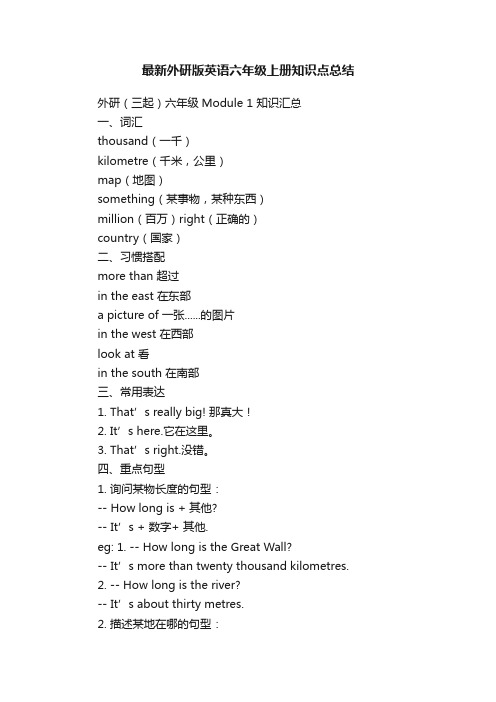
最新外研版英语六年级上册知识点总结外研(三起)六年级Module 1 知识汇总一、词汇thousand(一千)kilometre(千米,公里)map(地图)something(某事物,某种东西)million(百万)right(正确的)country(国家)二、习惯搭配more than 超过in the east 在东部a picture of 一张......的图片in the west 在西部look at 看in the south 在南部三、常用表达1. That’s really big! 那真大!2. It’s here.它在这里。
3. That’s right.没错。
四、重点句型1. 询问某物长度的句型:-- How long is + 其他?-- It’s + 数字+ 其他.eg: 1. -- How long is the Great Wall?-- It’s more than twenty thousand kilometres.2. -- How long is the river?-- It’s about thirty metres.2. 描述某地在哪的句型:地名+ is in the + 方位词+ of + 其他.eg: 1. Beijing is in the north of China.2. New York is in the east of the US.外研(三起)六年级Module 2 知识汇总一、词汇Dancing(跳舞,舞蹈)Chinatown(唐人街,中国城)sometimes(有时)shop(商店)then(既然是这样,那么)ah(啊)strong(坚固的)专有名词:the Changjiang River(长江)the Huangshan Mountain(黄山)the West Lake(西湖)the Great Wall(长城)二、习惯搭配send an email to...给......发送电子邮件lots of 许多go to Chinatown 去唐人街Chinese dancing 中国舞蹈三、知识点tell sb about sth(告诉某人关于某事)四、重点句型there be 句型(be动词选择采用就近一致原则)举例:There is a cat and lots of big apples on the tree. There are many birds and a kite in the sky.外研(三起)六年级Module 3 知识汇总一、词汇1. collect 收集2. stamp 邮票3. hobby 业余爱好4. doll 玩具娃娃5. bicycle 自行车二、习惯搭配collect stamps 收集邮票have got 有fly kites 放风筝collect dolls 收集玩具娃娃ride my bicycle 骑自行车lots of很多三、惯用表达1. That’s right! 没错!2. Great! 太好了!3. What about you? 你呢?四、重点句型1. 主语+ is my hobby.eg: Collecting stamps is my hobby.2. 主语(不是第三人称单数)+ have got + 其他. eg: They have got famous people on them.3. –What’s your hobby? –主语+ is my hobby.eg: –What’s your hobby? –Flying kites is my hobby. 外研(三起)六年级Module 4 知识汇总一、词汇1. Thanksgiving (Thanksgiving Day)感恩节2. flag 旗;国旗3. fly(使)(旗帜)飘扬4. special 特殊的,特别的5. meal 餐6. sound 听起来7. football (美式)橄榄球8. race 比赛,竞赛9. lantern 灯笼10. hang 悬挂,吊二、习惯搭配1. Flag Day (美国)国旗制定纪念日2. moon cake 月饼3. the Mid–Autumn Festival 中秋节4. the Dragon Boat Festival 端午节5. the Lantern Festival 元宵节6. sing songs 唱歌7. a special meal 一顿特别的饭8. do dragon dances 舞龙9. hang lanterns 挂灯笼10. on TV在电视上11. fly the flag 升(国)旗12. my favourite festival 我最喜欢的节目13. go to see the dragon boat race 去看龙舟比赛14. a big family dinner 一顿丰盛的家庭晚餐三、惯用表达1. That’s lovely. 那太好了。
外研社六年级上册的知识点
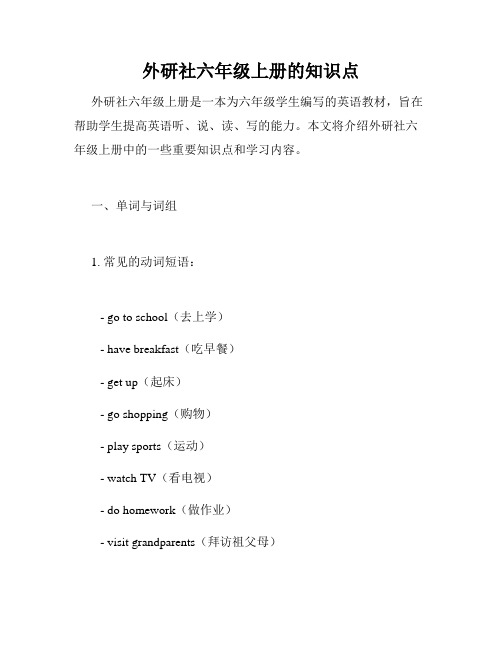
外研社六年级上册的知识点外研社六年级上册是一本为六年级学生编写的英语教材,旨在帮助学生提高英语听、说、读、写的能力。
本文将介绍外研社六年级上册中的一些重要知识点和学习内容。
一、单词与词组1. 常见的动词短语:- go to school(去上学)- have breakfast(吃早餐)- get up(起床)- go shopping(购物)- play sports(运动)- watch TV(看电视)- do homework(做作业)- visit grandparents(拜访祖父母)2. 介词短语:- in the morning(在早上)- on the weekend(在周末)- at school(在学校)- with friends(和朋友一起)- by bus(乘坐公交车)3. 数字与时间短语:- one, two, three(一、二、三)- Sunday, Monday, Tuesday(周日、周一、周二) - January, February, March(一月、二月、三月) - nine o'clock(九点钟)- half past five(五点半)二、语法知识1. 一般现在时:- 主语+动词原形(第三人称单数添加-s)- 例句:I go to school every day.(我每天去上学。
)2. 一般过去时:- 主语+动词过去式- 例句:He visited his grandparents yesterday.(他昨天拜访了他的祖父母。
)3. 现在进行时:- 主语+be动词+动词-ing- 例句:They are playing basketball now.(他们现在正在打篮球。
)4. 句型转换:- 肯定句转否定句:将be动词或助动词not放在句子中- 例句:He is reading a book.(肯定句)→ He is not reading a book.(否定句)三、阅读与写作1. 阅读理解:- 阅读短文,回答问题- 根据短文内容选择正确答案2. 书写规范:- 首字母大写,句末标点符号使用正确- 正确使用大小写和标点符号- 注意句子结构和语法准确性四、听力与口语1. 听力训练:- 听录音选择正确答案- 听短文回答问题2. 口语表达:- 与同学进行简单对话- 用英语描述自己的日常活动五、综合能力训练1. 语音练习:- 根据音标正确发音- 重点练习常见单词和短语的发音2. 写作训练:- 根据给定的话题写短文- 提高写作能力和写作表达的逻辑性通过学习外研社六年级上册的知识点,学生们可以逐渐提高英语的听、说、读、写的能力。
外研社英语教材(一年级起点版)六年级上册知识点总结
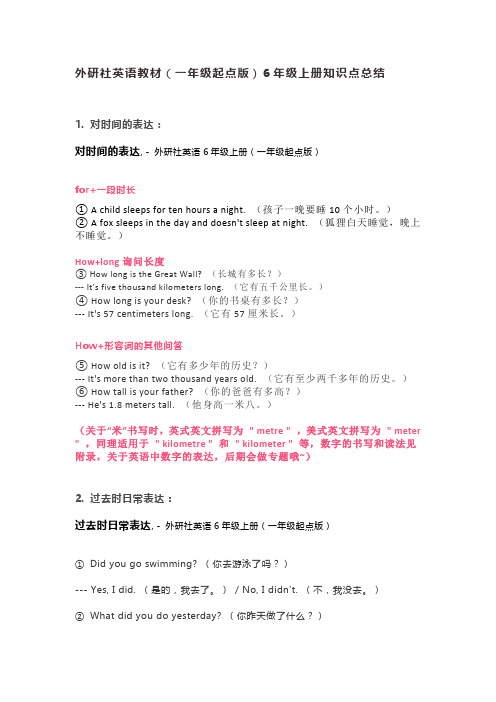
外研社英语教材(一年级起点版)6年级上册知识点总结1. 对时间的表达:对时间的表达, - 外研社英语6年级上册(一年级起点版)for+一段时长① A child sleeps for ten hours a night. (孩子一晚要睡10个小时。
)② A fox sleeps in the day and doesn't sleep at night. (狐狸白天睡觉,晚上不睡觉。
)How+long询问长度③ How long is the Great Wall? (长城有多长?)--- It's five thousand kilometers long. (它有五千公里长。
)④ How long is your desk? (你的书桌有多长?)--- It's 57 centimeters long. (它有57厘米长。
)How+形容词的其他问答⑤ How old is it? (它有多少年的历史?)--- It's more than two thousand years old. (它有至少两千多年的历史。
)⑥ How tall is your father? (你的爸爸有多高?)--- He's 1.8 meters tall. (他身高一米八。
)(关于“米”书写时,英式英文拼写为" metre " ,美式英文拼写为" meter " ,同理适用于" kilometre " 和" kilometer " 等,数字的书写和读法见附录,关于英语中数字的表达,后期会做专题哦~)2. 过去时日常表达:过去时日常表达, - 外研社英语6年级上册(一年级起点版)①Did you go swimming? (你去游泳了吗?)--- Yes, I did. (是的,我去了。
)/ No, I didn't. (不,我没去。
外研版六年级上册英语全册知识清单考点汇总
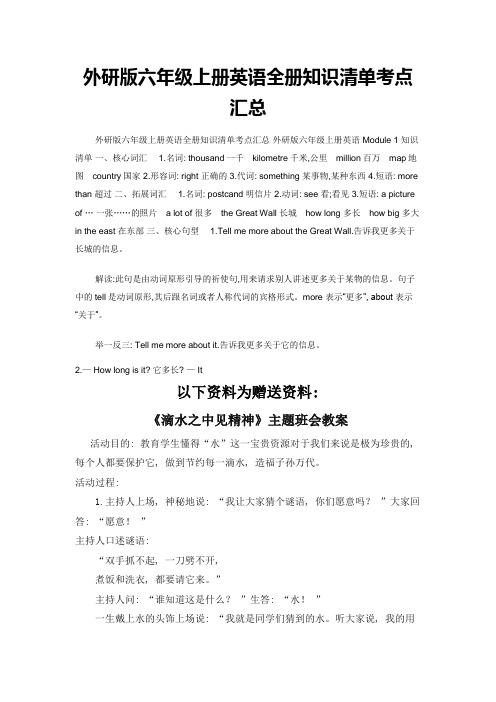
外研版六年级上册英语全册知识清单考点汇总外研版六年级上册英语全册知识清单考点汇总外研版六年级上册英语 Module 1 知识清单一、核心词汇 1.名词: thousand一千kilometre千米,公里million百万map地图country国家 2.形容词: right 正确的 3.代词: something 某事物,某种东西 4.短语: more than 超过二、拓展词汇 1.名词: postcand 明信片 2.动词: see 看;看见 3.短语: a picture of …一张……的照片 a lot of 很多the Great Wall 长城how long 多长how big 多大in the east 在东部三、核心句型 1.Tell me more about the Great Wall.告诉我更多关于长城的信息。
解读:此句是由动词原形引导的祈使句,用来请求别人讲述更多关于某物的信息。
句子中的tell是动词原形,其后跟名词或者人称代词的宾格形式。
more 表示“更多”, about 表示“关于”。
举一反三: Tell me more about it.告诉我更多关于它的信息。
2.— How long is it? 它多长? — It以下资料为赠送资料:《滴水之中见精神》主题班会教案活动目的: 教育学生懂得“水”这一宝贵资源对于我们来说是极为珍贵的, 每个人都要保护它, 做到节约每一滴水, 造福子孙万代。
活动过程:1.主持人上场, 神秘地说: “我让大家猜个谜语, 你们愿意吗?”大家回答: “愿意!”主持人口述谜语:“双手抓不起, 一刀劈不开,煮饭和洗衣, 都要请它来。
”主持人问: “谁知道这是什么?”生答: “水!”一生戴上水的头饰上场说: “我就是同学们猜到的水。
听大家说, 我的用处可大了, 是真的吗?”主持人: 我宣布: “水”是万物之源主题班会现在开始。
水说: “同学们, 你们知道我有多重要吗?”齐答: “知道。
外研版六年级名词辨析句型易错题汇总
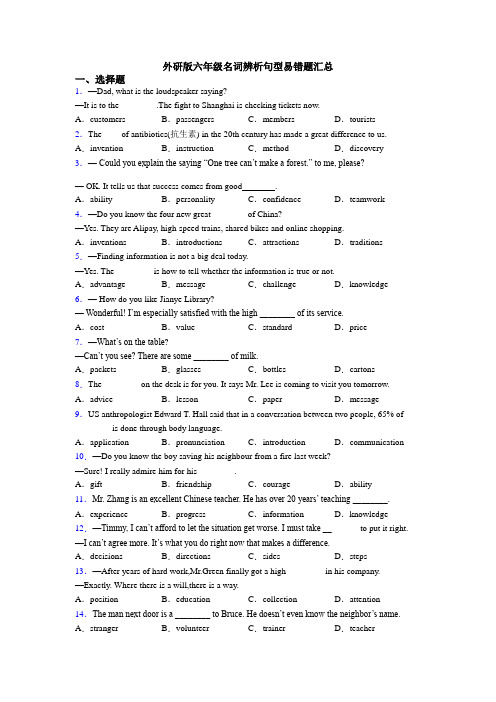
外研版六年级名词辨析句型易错题汇总一、选择题1.—Dad, what is the loudspeaker saying?—It is to the ________.The fight to Shanghai is checking tickets now.A.customers B.passengers C.members D.tourists 2.The ____of antibiotics(抗生素) in the 20th century has made a great difference to us. A.invention B.instruction C.method D.discovery 3.—Could you explain the saying “One tree can’t make a forest.” to me, please?— OK. It tells us that success comes from good .A.ability B.personality C.confidence D.teamwork 4.—Do you know the four new great ________of China?—Yes. They are Alipay, high-speed trains, shared bikes and online shopping. A.inventions B.introductions C.attractions D.traditions 5.—Finding information is not a big deal today.—Yes. The ________ is how to tell whether the information is true or not.A.advantage B.message C.challenge D.knowledge 6.— How do you like Jianye Library?—Wonderful! I’m especially satisfied with the high ________ of its service.A.cost B.value C.standard D.price 7.—What’s on the table?—Can’t you see? There are some ________ of milk.A.packets B.glasses C.bottles D.cartons 8.The ________ on the desk is for you. It says Mr. Lee is coming to visit you tomorrow. A.advice B.lesson C.paper D.message 9.US anthropologist Edward T. Hall said that in a conversation between two people, 65% of ________ is done through body language.A.application B.pronunciation C.introduction D.communication 10.—Do you know the boy saving his neighbour from a fire last week?—Sure! I really admire him for his ________.A.gift B.friendship C.courage D.ability 11.Mr. Zhang is an excellent Chinese teacher. He has over 20 years’ teaching ________. A.experience B.progress C.information D.knowledge 12.—Timmy, I can’t afford to let the situation get worse. I must take ________ to put it right.—I can’t agree more. It’s what you do right now that makes a difference.A.decisions B.directions C.sides D.steps 13.—After years of hard work,Mr.Green finally got a high ________ in his company.—Exactly. Where there is a will,there is a way.A.position B.education C.collection D.attention 14.The man next door is a ________ to Bruce. He doesn’t even know the neighbor’s name. A.stranger B.volunteer C.trainer D.teacher15.Would you send me some ________ of yours? I miss you very much!A.magazines B.photos C.phones D.works 16.When autumn comes, the ________ will turn yellow, and fall from the tree. A.mountains B.leaves C.birds D.plants 17.—Mr. Green, I can't remember some of the words. What should I do?—Don't worry! Why not try to make ___________ with them?A.decisions B.sentences C.suggestions D.choices18.Wu Wei, a young artist, has received high_________ from the art community for this sculpturesA.pride B.praise C.promise D.progress19.—I didn’t have the to go out alone at night when I was a little child.—So did I. But now I’m brave enough.A.courage B.power C.ability D.chance20.I have a poor ________ of direction, so I am afraid to go out alone.A.scene B.silence C.service D.sense21.If you’re good at English, you will have on e more ________ when searching for jobs. A.method B.advantage C.interest D.interview22.A factory will be built for the __________ of this type of new energy car.A.position B.population C.production D.pronunciation 23.This is a ________ of our city. Look! Our school is here.A.map B.music C.name D.team24.One person’s ________ doesn’t depend on how much money he has made, but on how many contributions he has made to our country.A.experience B.value C.wealth D.career25.With the development of the service industry, the working ________ is increasing and more jobs should be offered.A.invention B.pronunciation C.introduction D.population 26.—I have great ________ in learning Chemistry and I am so worried. Could you help me?—Sure. I would be glad to.A.interest B.trouble C.fun D.joy27.— Could you tell me more about Chinese ________, Mr. Li?— Sure. For example, we usually eat rice dumplings on the Dragon Boat Festival.A.customs B.services C.symbols D.holidays28.I was attracted by the lady’s warm smile. It was really like a hidden ________ . A.pleasure B.treasure C.attention D.invention 29.—Wow, you play the violin so well!—Thank you, but that’s the only musical ________ I can play.A.instruction B.instrument C.introduction D.invention30.All the ________ was for nothing because the visit was cancelled. Put it away now.A.pollution B.connection C.suggestion D.preparation 31.—Searching for information is not a big deal today.—Exactly, the ________ is how we can tell whether the information is true or not. A.advantage B.message C.challenge D.knowledge 32.Recently, he seemed to be not himself and gave up many chances. We’d better do something to stop him losing the ________ of his life.A.sense B.course C.direction D.condition 33.The filmmakers should pay more attention to improving the ________ of a film than making more money.A.quality B.position C.charity D.personality 34.—Yuan Longping and his team have succeeded in planting saltwater rice.—I’ve heard about it. He has made a huge ________ to our country’s agriculture.A.invention B.competition C.contribution D.production 35.—Our country is developing so quickly.—I think so. School should care about the full ________ of students’ talents.A.situation B.condition C.development D.standard 36.—Have you heard of a new technology about TV?—Yes. It’s “8K TV”. I believe that it will make a great ________ to people’s life.A.surprise B.progress C.difference D.choice37.— Could you take out the rubbish and do the dishes, Tony?— Sure! Mom will be angry if she sees this ________, I think.A.matter B.mess C.trouble D.difficulty 38.—What’s your mother?—She is a ________ in a company.A.nurse B.farmer C.doctor D.manager 39.—Michael, could you tell me the way to Haian Museum?—Sorry. But you can download a map app on your phone that can show you ________ and guide you to where you want to go.A.conversation B.location C.invention D.introduction 40.—Do you know a Chinese called ChenGao?—Exactly, his ________ makes the whole world shocked and he becomes the youngest PHD supervisor(博导)in Math area.A.advantage B.progress C.achievement D.attention【参考答案】一、选择题1.B解析:B【详解】句意:——爸爸,广播在说什么?——是说给乘客的。
外研版(三年级起点)英语六年级下册易错考点汇总课件

1 one 2 two 3 three 4 four 5 five 6 six 7 seven 8 eight 9 nine 10 ten
11 eleven 12 twelve 13 thirteen 14 fourteen 15 fifteen 16 sixteen 17 seventeen 18 eighteen 19 nineteen 20 twenty
一般过去时态
A
描述 过去 产生 的事
B
描述 正在 产生 的事
be + Ving
C
描述 将来 产生 的事
I后am,you后are , is跟着他,她,它
(he ,she,it) 单数后面变is , 复数后面变成are.
be动词口诀
I后am,you后are is 跟着他她它 单数后面变is 复数后面变成are
____doing my homework. ____lestening music. ____talking to you. _____playing football.
2.句型结构:
主语+ be going to+动词( 短语)原形/地点(+ 时间).
I+ am
tomorrow (明天) next month (下个月)
You、We、They、复数名词+ are tomorrow morning (明天上午) soon (不久).....
He、She、 It、 单数名词+is
Let’s relax
She is going to watch TV .
They are going to play football .
He is going to go swimming .
外研版六年级非谓语动词考点易错点的总结
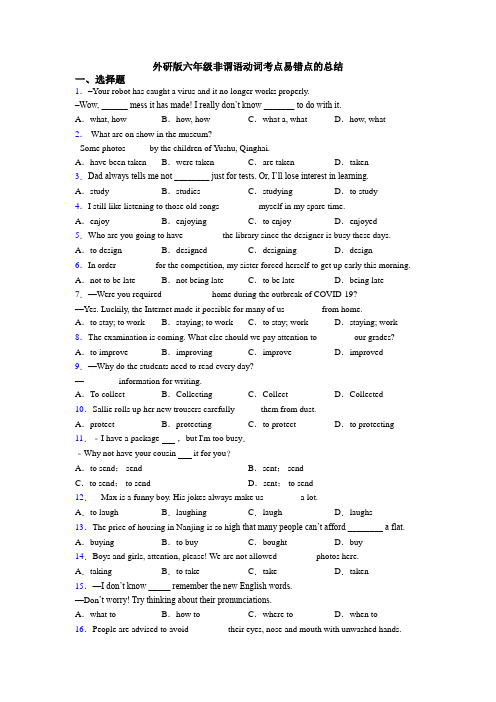
外研版六年级非谓语动词考点易错点的总结一、选择题1.–Your robot has caught a virus and it no longer works properly.–Wow, ______ mess it has made! I really don’t know _______ to do with it.A.what, how B.how, how C.what a, what D.how, what 2.-What are on show in the museum?-Some photos _____by the children of Yushu, Qinghai.A.have been taken B.were taken C.are taken D.taken3.Dad always tells me not ________ just for tests. Or, I’ll lose interest in learning. A.study B.studies C.studying D.to study4.I still like listening to those old songs ________ myself in my spare time.A.enjoy B.enjoying C.to enjoy D.enjoyed 5.Who are you going to have ________ the library since the designer is busy these days. A.to design B.designed C.designing D.design6.In order ________ for the competition, my sister forced herself to get up early this morning. A.not to be late B.not being late C.to be late D.being late 7.—Were you required___________ home during the outbreak of COVID-19?—Yes. Luckily, the Internet made it possible for many of us________ from home.A.to stay; to work B.staying; to work C.to stay; work D.staying; work 8.The examination is coming. What else should we pay attention to ________our grades? A.to improve B.improving C.improve D.improved 9.—Why do the students need to read every day?—________information for writing.A.To collect B.Collecting C.Collect D.Collected 10.Sallie rolls up her new trousers carefully _____ them from dust.A.protect B.protecting C.to protect D.to protecting 11.﹣I have a package ,but I'm too busy.﹣Why not have your cousin it for you?A.to send; send B.sent; sendC.to send; to send D.sent; to send12.---Max is a funny boy. His jokes always make us ________a lot.A.to laugh B.laughing C.laugh D.laughs 13.The price of housing in Nanjing is so h igh that many people can’t afford ________ a flat. A.buying B.to buy C.bought D.buy14.Boys and girls, attention, please! We are not allowed ________ photos here.A.taking B.to take C.take D.taken15.—I don’t know _____ remember the new English words.—Don’t worry! Try thinking about their pronunciations.A.what to B.how to C.where to D.when to 16.People are advised to avoid ________ their eyes, nose and mouth with unwashed hands.A.touch B.touched C.touching D.to touch 17.Our parents won't allow us _____ in the river alone.A.swimB.to swimC.swimmingD.swam18.—There are so many kinds of Mp5 in the shop. We can’t decide _________.— What about this pink one?A.what to buy B.to buy what C.which to buy D.to buy which 19.—Suzy, when you leave your bedroom, please turn off the lights energy.—I will, Mum.A.save B.to save C.saving D.saved20.My uncle made up his mind to devote his life pollution happily.A.to prevent; to live B.to prevent; from livingC.to preventing; to live D.to preventing; from living21.一Have you got the tickets for the concert?一Not yet,I didn't realize difficult it was the tickets.A.what; to get B.what; getting C.how; to get D.how; getting22.—Do you often hear Lucy ________in her room?—Yes, listen! Now we can hear her ________ in her room.A.sing; sing B.singing; singing C.singing; sing D.sing; singing 23.There ______ a group of people _______on the beach.A.is, lying B.are, lying C.have, laid D.has,lie24.My watch doesn’t work. I must h ave it ________.A.Repairing B.to repair C.repair D.repaired25.I think that AI(人工智能) ________ in many fields will ________ to help us solve many problems in the future.A.used;be used B.is used;be used C.used;use26.A medical team, ________ five experienced doctors and ten skillful nurses, was sent to the earthquake-stricken area in Turkey.A.made up of B.made of C.made from D.made by 27.The music ________ by Mozart is well known ________ people all over the world. A.writes; as B.written; for C.written; as D.written; to 28.To protect endangered elephants, government should make rules to prevent people from buying and selling things___________ of ivory(象牙).A.make. B.are made C.be made D.made 29.—What are on show in the library?— Some photos ________ on the Great Wall.A.are taken B.taken C.are taking D.were taken 30.In recent years, many children are made ________ what they don’t show________A.do; interested in B.to do; interest C.do; interested D.to do; interest in 31.—Excuse me, can you explain the reason to me again?—Sorry, I know what I want to say but I have difficulty ______ myself clearly.A.express B.to express C.expressing D.to be expressed 32.While all Chinese are fighting COVID-19, medical staff(工作人员) ________ on the front line are heroes.A.stood B.stand C.standing D.to stand33.---Is Jack in the next room ?---It’s hard to say. But I heard him _____ loudly when I passed by just now.A.speak B.to speak C.spoken D.speaking 34.Lily’s parents always encourage her ____out her opinions.A.speak B.speaking C.to speak D.spoken 35.—Your hair is too long.—Haha. I just want to have my hair ______this afternoon.A.to cut B.cutting C.cut D.cuting36.A woman was found ________ in her house this morning. The police said she was wounded with a knife and bled to ________.A.died; death B.death; dead C.dead; death D.death; death 37.—Mum, my computer doesn’t work. It needs_________ .—OK. I will have it _________.A.repairing; repaired B.to repair; repairC.be repaired; repairing D.being repaired; to repair38.The film _______ real-life events ________ by Li An. It’s moving.A.based upon, directed B.based upon, was directedC.was based upon, directed D.was based upon, was directed 39.—How much difficulty did you have ________ this problem?—________. It’s quit e easy.A.to solve; Nothing B.to solve; None C.solving; None D.solving; Nothing 40.Many students admitted ________ games once in a while when they took online courses. A.play B.played C.playing D.to play 41.China has successfully prevented the Covid-19 from _______ through the country. A.spread B.to spread C.spreading D.spreads 42.—What do you remember about Grade 7?―I remember________a prize in the school writing competition.A.to win B.win C.winning D.won 43.Huawei has succeeded in ________new software f or his products. I can’t wait ________a new Huawei mobile.A.developing, to buy B.developed, buying C.developing, buy D.develop, buying 44.— Jack, why have you decided ________ Chinese folk music as a course.— To learn more about Chinese culture.A.take B.taken C.to take D.taking45.All of us should know what attention should be paid to __________ a more beautiful Huai'an. A.building B.to build C.build D.have built 46.—The construction of Subway Line 4 in Jinan has begun!—Wonderful. It will be more convenient for people _________ in the suburb to travel around. A.live B.living C.lived D.lives47.—Do you have any plans for the holiday?—Yes, I’m planning to travel to Jiuzhaigou. I’m looking forward to ________ the colourful lakes and amazing waterfalls.A.see B.seeing C.sees D.saw48.I think his advice is of great . It's well worth .A.value, taking B.value, to takeC.valuable, to take D.valuable, taking49.I hope everyone can care about ______ the environment and stop ______ things. A.protecting; wasting B.protecting; to wasteC.protect; wasting D.protect; to waste50.—Do you mind beside you, sir?— . I alone to enjoy the music.A.my sitting; Better not; used to sitB.my to sit; Of course not; am used to sittingC.me sitting; I’m sorry but I do; have been used to sittingD.me to sit; Never mind; was used to sitting51.He made up his mind to devote his life pollution happily.A.to prevent, to live B.to prevent, from livingC.to preventing, to live D.to preventing, from living52.This educational CD-ROM makes _____ easier for you to learn English. After using it for a month, you’ll have no difficulty ________ with foreigners.A.that; to talk B.it; to talkC.that; talking D.it; talking53.--- Have you seen the movie《Lost in Thailand》?--- Yeah, it’s truly worth ________. It’s ________ interesting that I’ve seen it twice. A.seeing; too B.to see; enough C.seeing; so D.to see; such54.You’d better give up smoking at once.A.start smoking B.start to smoke C.stop smoking D.stop to smoke 55.—Did everyone attend the concert last night?—No, Emily preferred ________ TV at home to ________ the concert.A.to watch; attend B.to watch; attending C.watching; attend D.watching; attending 56.Dear friends, ________ your best and relaxing yourselves are two helpful ways to get a high grade in this exam. Wish you success.A.try B.trying C.to try D.tries57.Peter enjoys ________ pictures in the country on Sundays.A.draw B.drawing C.to draw D.drew 58.WeChat has given up ________ in a popular emoji (表情) recently. The “soldier face” emoji doesn’t have a cigarette in his mouth anymore.A.smokes B.smoked C.to smoke D.smoking 59.—Were you born in Baiyin City?—No, I wasn’t. But I have been used ________ in the city si nce I moved here ten years ago. A.live B.to live C.living D.to living60.In spring, a mask can be helpful if flowers make your nose uncomfortable.A.wear B.wore C.wearing D.worn【参考答案】一、选择题1.C解析:C【解析】句意:——你的机器人已经感染了病毒,它已经不能正常工作了。
六年级英语易错知识点(一)
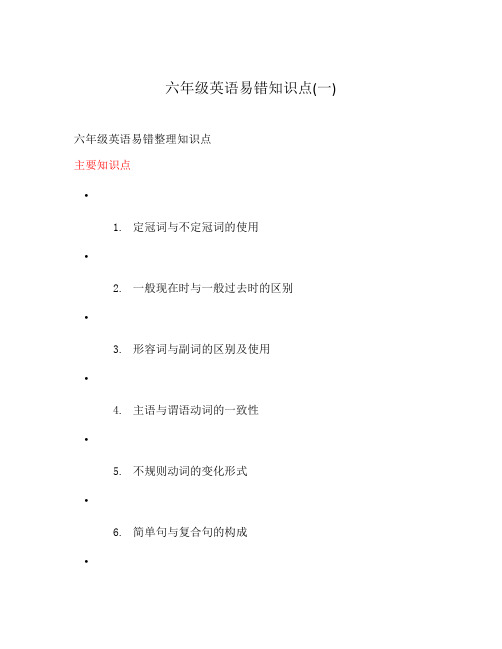
六年级英语易错知识点(一)六年级英语易错整理知识点主要知识点•1.定冠词与不定冠词的使用•2.一般现在时与一般过去时的区别•3.形容词与副词的区别及使用•4.主语与谓语动词的一致性•5.不规则动词的变化形式•6.简单句与复合句的构成•7.疑问句与否定句的表达1. 定冠词与不定冠词的使用•定冠词”The”用于特指已被提到过的人或物;•不定冠词”A/An”用于泛指未被提到过的人或物。
2. 一般现在时与一般过去时的区别•一般现在时表示经常性的动作或事实;•一般过去时表示过去发生的具体事件。
3. 形容词与副词的区别及使用•形容词用于修饰名词,表示事物的特征或状态;•副词用于修饰动词、形容词或其他副词,表示动作的方式、程度或频率。
4. 主语与谓语动词的一致性•主语与谓语动词在人称和数上必须保持一致。
5. 不规则动词的变化形式•不规则动词在过去式和过去分词形式上不遵守规则变化,需记忆。
6. 简单句与复合句的构成•简单句由主语和谓语构成,表达一个完整的句子意思;•复合句由一个或多个主句和一个或多个从句构成,从句可以充当名词、形容词或副词。
7. 疑问句与否定句的表达•疑问句使用助动词或疑问词来构成疑问句式;•否定句使用否定词在谓语动词前进行构成。
以上是六年级英语易错的主要知识点,掌握了这些知识点可以帮助同学们更好地理解英语语法规则,提高自己的英语水平。
学习英语需要持之以恒,多做练习题,并及时纠正错误,相信你们会取得好成绩的!8. 介词的使用•介词用来表示人或物之间的位置、方向、时间、原因等关系,如in, on, at, to, for等。
•需要注意不同介词的用法和搭配,例如in the morning, on the table, at school, go to the park等。
9. 句子的基本结构•英语句子的基本结构是主语+谓语+宾语,也可以有其他成分如定语、状语等。
•需要注意主谓一致、宾语的选择和位置等,使句子表达清晰准确。
- 1、下载文档前请自行甄别文档内容的完整性,平台不提供额外的编辑、内容补充、找答案等附加服务。
- 2、"仅部分预览"的文档,不可在线预览部分如存在完整性等问题,可反馈申请退款(可完整预览的文档不适用该条件!)。
- 3、如文档侵犯您的权益,请联系客服反馈,我们会尽快为您处理(人工客服工作时间:9:00-18:30)。
一、学生易错词汇1. a, an的选择:元音字母开头的单词用an,辅音字母开头的单词用a.2. am , is , are的选择:单数用is , 复数用are. I 用 am , you 用 are.3. have , has 的选择:表示某人有某物.单数用has , 复数用have.I ,you 用 have .4. there is, there are 的选择:表示某地有某物,某人.单数用there is , 复数用there are.5. some, any 的选择:肯定句用some, 疑问句和否定句用any.6. 疑问词的选择:what (什么) who (谁) where (哪里) whose (谁的) why(为什么)when(什么时候)which(哪一个)how old (多大) how many (多少)how much(多少钱)二、形容词比较级详解当我们需要对事物作出比较时,需要用到比较级.比较级的句子结构通常是:什么 + 动词be (am , is , are ) + 形容词比较级 + than(比)+ 什么 ,如:I'm taller and heavier than you. (我比你更高和更重.)An elephant is bigger than a tiger. (一只大象比一只老虎更大.) 形容词的比较级是在形容词的基础上变化而来的,它的变化规则是:①一般的直接在词尾加er ,如 tall - taller , strong - stronger ,②以e结尾的,直接加r ,如 fine – finer ,③以辅音字母加y结尾的,先改y为i再加er,如funny - funnier④双写最后的字母再加er,如big –bigger, thin –thinner ,hot – hotter☆注意☆比较的两者应该是互相对应的可比较的东西.典型错误:My hair is longer than you.(我的头发比你更长.)比较的两者是我的头发,你(整个人),那么比较的对象就没有可比性. 应该改为:My hair is longer than yours. 或My hair is longer than your hair.比较级专项练习:1.从方框中选出合适的单词完成句子 heavy tall long big(1) How is the Yellow River(2) How is Mr Green He's 175cm.(3) How are your feet I wear size 18.(4)How is the fish It's 2kg.2.根据句意写出所缺的单词(1) I'm 12 years old. You're 14. I'm than you.(2) A rabbit's tail is than a monkey's tail.(3) An elephant is than a pig.(4) A lake is than a sea.(5) A basketball is than a football.3.根据中文完成句子.(1) 我比我的弟弟大三岁. I'm than my brother.(2) 这棵树要比那棵树高. This tree than that one.(3) 你比他矮四厘米. You are than he.(4) 谁比你重 than you三、动词过去式详解动词的过去式的构成规则有:A,规则动词①一般直接在动词的后面加ed:如 worked , learned , cleaned , visited②以e结尾的动词直接加d:如 lived , danced , used③以辅音字母加y结尾的动词要改y为i再加ed(此类动词较少)如study – studied carry – carried worry –worried (注意play,stay不是辅音字母加y,所以不属于此类)④双写最后一个字母(此类动词较少)如 stoppedB,不规则动词(此类词并无规则,须熟记)小学阶段要记住以下动词的原形和过去式:sing – sang , eat – ate , see – saw , have – had , do – did , go - went , take - took , buy - bought , get - got , read - read ,fly - flew , am/is - was ,are - were , say - said , leave - left , swim - swam , tell - told , draw - drew , come - came , lose - lost , find - found , drink - drank , hurt - hurt , feel - felt四、动词现在分词详解动词的ing形式的构成规则:①一般的直接在后面加上ing , 如doing , going , working ,singing , eating②以e 结尾的动词,要先去e再加ing ,如having , writing③双写最后一个字母的(此类动词极少)有:running , swimming , sitting , getting五、人称和数六、句型专项归类肯定句:是指用肯定的语气来陈述的句子,如:I'm a student. She is a doctor. He works in a hospital.There are four fans in our classroom. He will eat lunch at 12:00. I watched TV yesterday evening.2,否定句:含有否定词或表示否定意义词的句子,如:I'm not a student. She is not (isn't) a doctor.He does not (doesn't) work in a hospital. There are not (aren't) four fans in our classroom.He will not (won't) eat lunch at 12:00. I did not (didn't) watch TV yesterday evening.☆注意☆小结:否定句主要是在肯定句的基础上加上了否定词 "not".有动词be的句子则"not"加在be后面,可缩写成"isn't, aren't",但am not 一般都分开写.没有动词be的句子则要先在主要动词的前面加上一个助动词(do, does, did),然后在它后面加上"not",你也能够把它们缩写在一起如"don't , doesn't , didn't ).这三个助动词要根据人称和时态来选择,其中"does"只用于一般现在时主语是第三人称单数的情况,而"did"只用于一般过去时,不论主语是什么人称和数,都用"did" .一般疑问句:是指询问事实的句子,此类句子必须用"yes",或"no"来回答.如:Are you a student Yes, I am / No, I'm not.Is she a doctor Yes, she is. / No, she isn't.Does he work in a hospital Yes, he does. / No, he doesn't. Are there four fans in our classroom Yes, there are. / No, there aren't.Are you going to buy a comic book tonight Yes, I am. / No, I am not. (Yes, we are. / No, we aren't.)Will he eat lunch at 12:00 Yes, I will. / No, I will not(won't). Are they swimming Yes, they are. / No, they aren't.Did you watch TV yesterday evening Yes, I did. / No, I didn't. ☆注意☆小结:一般疑问句是在肯定句的基础上,②动词be调到首位,其他照写,末尾标点符号变成问号即可.②没有动词be的句子则要在句首加上一个助动词(do, does, did)再把紧跟在后面的动词变回原形,末尾标点符号变成问号即可.这三个助动词也要根据人称和时态来选择,其中"does"只用于一般现在时主语是第三人称单数的情况,而"did"只用于一般过去时,不论主语是什么人称和数,都用"did" .一般疑问句有个重要的原则就是问和答要一致,即问句里的第一个单词(助动词)和简略答句里的这个词是一致的.特殊疑问句:以特殊疑问词(what , where , who , which , when , whose , why , how等)开头引导的句子.此类句子应该问什么就答什么,不能用"yes ,no"来回答.如:What is this It's a computer.What does he do He's a doctor.Where are you going I'm going to Beijing.Who played football with you yesterday afternoon Mike. Which season do you like best Summer.When do you usually get up I usually get up at 6:30. Whose skirt is this It's Amy's.Why do you like spring best Because I can plant trees.How are you I'm fine. / I'm happy.How did you go to Xinjiang I went to Xinjiang by train.☆其中how又能够和其他一些形容词连用组成特殊疑问词组用来提问,如: how many(多少(数量)), how much(多少(钱)), how tall(多高), how long(多长), how big(多大), how heavy(多重)例句:How many pencils do you have I have three pencils. How many girls can you see I can see four girls.How many desks are there in your classroom There are 51.☆小结:how many 用来提问可数名词的数量,主要有以上三种句式搭配,How many + 名词复数 + do you have 你有多少……How many + 名词复数 + can you see 你能看见多少……How many + 名词复数 + are there…有多少……七:完全,缩略形式:I'm=I am he's=he is she's=she is they're=they are you're=you are there's=there is they're=they are can't=can not don't=do not doesn't=does not isn't=is not aren't=are not let's=let us won't=will not I'll=I will wasn't=was not八、与字母相关的题型( 注:五个元音字母是 Aa Ee Ii Oo Uu )(1)将所给字母的大小写写在四线格上Hh Rr Xx Gg Mm Uu Zz Ff Qq Ii(2)写出下列字母的左邻右舍.1.( ) Hh ( )2.( ) Bb ( )3.( ) Ll ( )4.( ) Rr ( )5.( ) Qq ( )6.( ) Ww ( )(3)用小写字母抄写下列单词.1.ROOM( )2.UNDER( )3.PLEASE( )4.PICTURE( )5.WHERE( )6.TWINS( )7.EXCUSE( )8.HOW( )9.CAKE( ) 10.SMALL( )(4)将全是元音字母的那一组圈起来1. a c e2. i e o3. v u k4. e u I5. J B I6. E T V7. EI O 8. A U E(5)写出与所给单词发音相同的字母(大小写).1.bee ( )2.sea ( )3.tea ( )4.are ( )5.why ( )6.you ( )。
